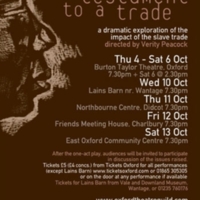
Testament to a Trade
Testament to a Trade was a play produced to mark the bicentenary, with close reference to Oxfordshire. Written by three local writers, the play was produced by Oxford Theatre Guild in collaboration with Oxfordshire Record Office and the Oxford Playhouse. Testament to a Trade weaves accounts of past and present slavery, and is situated in historical and contemporary contexts, notably 18th century Africa and Oxford, and contemporary Eastern Europe and Oxford. A number of archive materials relating to slavery and abolition are held by Oxfordshire Record Office, information on which inspired elements of the story. A teachers pack was produced to inform similar projects. The play opened at Burton Taylor Theatre in Oxford, and toured venues across Oxfordshire.
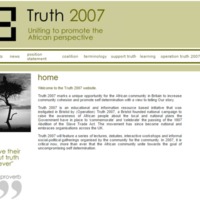
Truth 2007: Uniting to promote the African perspective
Truth 2007 was an educational and information resource-based initiative that was instigated in Bristol by (Operation) Truth 2007 led by Jendayi Serwah. It became a national coalition of UK-based Pan-African organisations which aimed to raise the awareness of the African perspective on local and national government plans to mark the bicentenary. Truth 2007 featured a series of lectures, debates, interactive workshops and informal social-political gatherings organised by community groups. The Truth 2007 coalition expressed dissatisfaction with much of the terminology and focus of the 'official' commemorations.
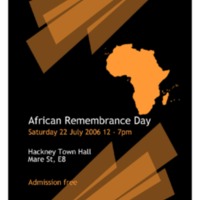
The Ligali organisation, 2007
Ligali is a Pan-African human rights organisation that challenges the misrepresentation of African people, culture and history in the British media. It produced various responses to promote the African perspective of the 2007 bicentenary, including their 'Declaration of Protest to the 2007 Commemoration' expressing dissatisfaction with much of the terminology and focus of the 'official' commemorations. Their particular focus was on the ‘Maafa’, derived from the Kiswahili word meaning ‘great disaster’, and referring to the ongoing impact of enslavement and colonialism for African peoples. The publication ‘Addressing Maafa denial and slavery apologists’ was a guide to promoting the truth about the Maafa from an Africentric position.
‘Maafa: Truth 2007’ is a documentary film directed by the Ligali founder, Toyin Agbetu, and produced by Ligali’s then head of media affairs, emma pierre. The film confronts some of the myths about British slavery, featuring contributions from community activists, project workers, teachers and the African British business community. The film was screened at various events, including African Remembrance Day at Hackney Town Hall in 2006. Ligali’s ‘Freedom Fighter’ stamps were designed by Emma Pierre-Joseph as a response to the Royal Mail’s publication of six stamps to mark the bicentenary. ‘The Walk’ is a documentary record of Toyin Agbetu’s protests at the service at Westminster Abbey to mark the bicentenary on 27 March 2007.
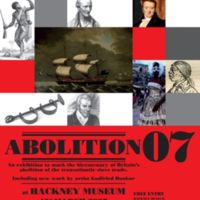
Abolition 07
Hackney Museum's Abolition 07 exhibition told the story of British involvement in the transatlantic slave trade, the resistance to it, and its abolition, and in particular emphasised the involvement of Hackney's residents in the abolition movement. The display included new artwork by Godfried Donkor in collaboration with young Hackney artists. A film of interviews with Hackney residents, Hear My Voice, was produced. Over 1200 children from Hackney Primary Schools took part in poetry workshops at the museum with poets Adisa and Baden Prince. Their poems and responses were published in the booklet 'And Still I Rise'.
The research into Hackney's connections to the transatlantic slave trade continued in 2013-2015 with 'Local Roots / Global Routes', a collaborative project between Hackney Museum and Archives and the Legacies of British Slave-ownership project.
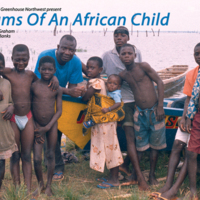
Dreams of an African Child
Dreams of an African Child is a one act play about the 21st century sale of children in the River Volta region of Ghana. It was written by Robin Graham, produced by The Ugly Tree and Greenhouse Northwest Theatre Company, and directed by Toria Banks. The drama centres on the reactions of a rural African family when their teenage son, missing presumed dead, returns home to his family after being sold eight years before. The play was first performed in Accra in 2004, and then in 2008 toured schools and community venues in the North of England and Wales. Workshops were held to discuss the issues of child trafficking raised by the play.
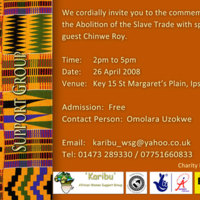
Karibu African Women's Support Group
Karibu provides information, advice and help service to African women and their families in Ipswich and Suffolk. Karibu women joined the celebrations marking African History Month in Suffolk in 2007. The event 'Reaching Out Promoting Cultural Values' was designed to reach out to other local communities. It featured a keynote speaker address, workshops on health and beauty, and parades of foods and culture from Africa. 'Our Children Our Pride' was an activity day featuring carnival arts and crafts, drumming sessions, dance, and stories from Africa.
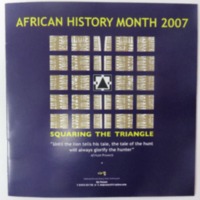
African History Month 2007: Squaring the Triangle
Squaring the Triangle was the theme of African History Month 2007 in Suffolk. The programme was co-ordinated by the Nia Project (a cultural, arts and heritage project) and explored the history and legacy of slavery through film, literature, exhibition, music and debate. The theme of Squaring the Triangle was underpinned by the African proverb, ‘Until the Lion tells his tale the tale of the hunt will always glorify the hunter’. Highlights included the Nia Memorial Lecture, given by the producer-director Pam Solomon-Fraser. Nubian Films short season looked at the current legacy of slavery and the Diaspora of African peoples. Talks, workshops and debates covered issues such as reparations, retribution, resistance, and educational guidelines for parents on how to discuss the African slave trade with children. Special recognition was given in the programme to Ghana’s 50th anniversary as an independent state. There were heritage walks around Ipswich to uncover some of the cultural connections with Africa, the Caribbean and Suffolk. A Youth Day Conference hosted by the Zimbabwe Youth brought together young people from the community to use music and poetry to explore their ideas on the legacy of the slave trade. Historian Maureen James and representatives from Suffolk County Council led pupils from local schools in researching the anti-slavery movements, with particular reference to the Clarkson family.
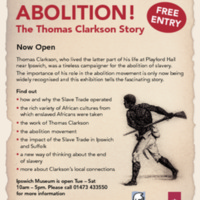
Abolition! The Thomas Clarkson Story
Colchester and Ipswich Museum Service produced an exhibition about slavery and the trade in enslaved Africans and the life of Thomas Clarkson, the abolitionist campaigner who lived the latter part of his life at Playford Hall near Ipswich. The exhibition focused in particular on the African and local history collections in the museum service. A replica mahogany travelling chest was produced as a handling box for local schools - Thomas Clarkson famously displayed a chest filled with materials from Africa and the slave trade while travelling on anti-slavery campaigns.
The exhibition was produced in collaboration with the Nia Project, and was part of a wider programme of events and outreach activities with local schools and African and Afro-Caribbean community groups. The artist Anissa-Jane worked with members of the Ipswich community to create a new art installation to accompany the exhibition.
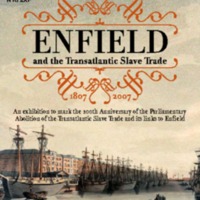
Enfield and the Transatlantic Slave Trade
An exhibition to mark the bicentenary was developed by Enfield Museum Service in partnership with the British Museum and Enfield Racial Equality Council. The exhibition looked at West African culture, the development of the local African community, the links between the transatlantic slave trade and Enfield, wealthy landowners and Quaker abolitionists who lived in the area. Free family days held during school vacations offered traditional Ghanaian story-telling, dancing and drumming, crafts and object handling. Living History Days gave visitors the opportunity to meet actors portraying William Wilberforce and Olaudah Equiano. School workshops included a drama session and performance about a runaway slave developed from material from Lambeth Archive. The museum service also produced a book, edited by Valerie Munday, which explored further the links between Enfield and the slave trade. The book was sent to all schools in the borough, and formed the basis of a teaching resource aimed at Key Stages 2 and 3. Loan boxes and handling collections provided by the museum service include Ghanaian artefacts and items relating to the slave trade. In 2011, Enfield Racial Equality Council unveiled a plaque to commemorate abolition at the Enfield Civic Centre.
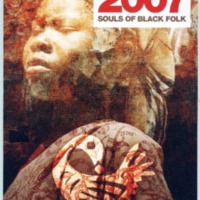
Black History Season Leicester 2007: Souls of Black Folk
Leicester's Black History Season in October-November 2007 marked the bicentenary of the abolition of the slave trade. Its aim was to redress the balance from a 'Eurocentric point of view' of abolition, and focus on the Afrikan perspective with the theme of 'Souls of Black Folk'. Musical performances included gospel, Motown, reggae and jazz. Other events in venues across Leicester and Loughborough included traditional South African dance, contemporary dance, performance poetry, comedy, multimedia performances, storytelling, theatre and an exhibition, 'Africa's Gift', focusing on the economic and cultural contributions of the slaves and their descendants.
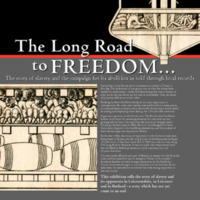
The Long Road to Freedom
As made clear by The Long Road to Freedom exhibition in 2007, the Record Office for Leicestershire, Leicester & Rutland contains a significant collection of documents which reveal local connections with the slave trade, and with those who campaigned for abolition. Several prominent local families owned slaves on plantations in the Caribbean and on the north coast of South America. Leading Leicester abolitionists, Elizabeth Heyrick and Susanna Watts, orchestrated a vigorous anti-slavery campaign in Leicester, including a boycott on sugar. Local landowner, Thomas Babington of Rothley Temple, was a friend of William Wilberforce and hosted meetings of anti-slavery campaigners at his home. The exhibition also highlighted a unique collection of mid-19th century papers which provide access to the voices of the enslaved in a slave court in Lagos, West Africa. It also told the stories of two former slaves, Rasselas Morjan and Edward Juba, who came to Leicestershire with their owners. This exhibition toured to various venues in the region, including Abbey Pumping Station, where it coincided with family activities focused on the work of Elizabeth Heyrick.
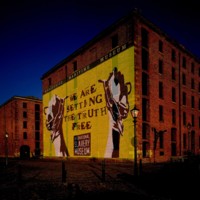
Opening of International Slavery Museum
Liverpool is a port city with a long association with transatlantic slavery. Located on Liverpool's Albert Dock, National Museums Liverpool opened the new International Slavery Museum in 2007, the first stage of a two-part development. The museum aims to promote the understanding of slavery and the transatlantic slave trade and the permanent impact the system has had on Africa, South America, the USA, the Caribbean and Western Europe. It features displays about West African society, the transatlantic slave trade and plantation life, but also addresses issues of freedom, identity, human rights, reparations, racial discrimination and cultural change. The museum also has strong ties with Liverpool’s large Black community. The museum opened on 23 August 2007, designated by UNESCO as Slavery Remembrance Day.
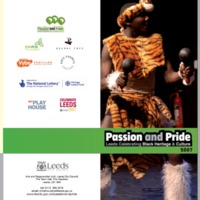
Passion and Pride
Passion and Pride was a creative partnership project bringing together Leeds City Council's Arts and Regeneration Unit with twelve local community organisations. Building on momentum established through Black History Month, the performances, exhibitions and workshops celebrated black heritage and culture in Leeds during 2007. Highlights included the performance of 'Grandma's Story' at West Yorkshire Playhouse by the 10-2 Club, a short play about the real life experience of living through slavery.
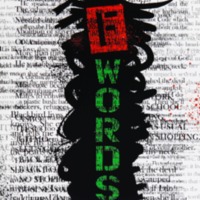
FWords
FWords was a creative response of eight Yorkshire writers and artists to the commemoration of the Abolition Act, in a project led by Peepal Tree Press in Leeds. Focusing on the many variations of the theme of 'Freedom', Fwords was created to raise the profile of Yorkshire's rich heritage of talented artists, descendants of those who migrated, forcefully and otherwise from Africa and beyond. The work of six writers was illustrated with work from two visual artists, and with a foreword from Caryl Phillips. The project was supported by printed materials, broadcasts, digital and dedicated web pages.
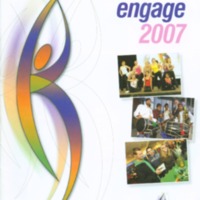
Engage 2007
The Engage 2007 Festival of Culture celebrated cultural freedoms in South Gloucestershire. Led by South Gloucestershire Council, and in partnership with local volunteer groups, schools and community groups, the festival took place on 17 November 2007. It featured 40 live performances of drama, dance and music from India, China, Africa, South America and Europe, a world food zone, family workshops, youth and environmental activities and 60 interactive and information stalls. The Impact exhibition was produced as part of Engage 2007, exploring the part that people living in South Gloucestershire played slavery and abolition.
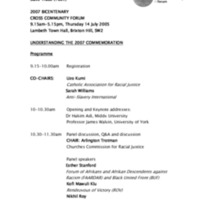
2007 Bicentenary Cross-Community Forum
The main aim of the 2007 Bicentenary Cross-Community Forum (2007BCCF) was to facilitate space for dialogue and alliance building in areas of work connected to the legacies of enslavement, related global injustices today and contemporary forms of slavery. The forum was jointly convened by Rendezvous of Victory, Anti-Slavery International and the World Development Movement. The education initiative aimed to assist in discussion and alliance-building on issues arising from the legacies of African Enslavement such as Maangamizi (Afrikan Holocaust) Awareness, Afriphobia, reparations, global injustices today and contemporary forms of enslavement. Open meetings were held in London between 2005 and 2007, and the group produced the 2007 Cross-community e-bulletin three times a year, including comment pieces about the significance of 2007. Task Action Groups were set up, such as the Cross-Community Dialogue Action Group on Education (CCODAGE), jointly hosted by the Council for Education in World Citizenship and the School of Education at Kingston University. A Global Justice Forum was developed out of the 2007BCCF in order to advance work beyond 2007.
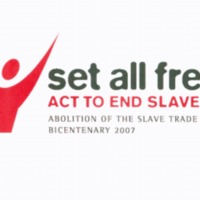
Set All Free: ACT TO END SLAVERY
Set All Free: ACT TO END SLAVERY was a project of Churches Together in England, based in London. It was also a collaboration between church-related groups, societies and organisations around the UK working together with a Christian ethos to assess the relevance of the bicentenary, and in particular the legacies of slavery. The project aimed to highlight how the values of the abolitionists can transform relationships on an individual, community and society level. The project included building a network coalition, campaigning, producing research and resources for churches, schools and individuals. Set All Free also worked closely with Anti-Slavery International and Rendezvous of Victory, a leading African community-led organisation.
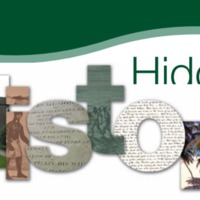
Hidden History of the Dales
This project was a collaboration between the Dales Countryside Museum in Hawes and North Yorkshire Record Office to research people and places of the Yorkshire Dales connected with Africa, the Caribbean and India. 'Hidden History' collected local stories of slave owners and traders, abolitionists, Africans and Asians who moved to the Dales, and others like the actor Ira Aldridge who passed through. The project included various community activities. Working with actor Joe Williams, pupils from the Wensleydale School explored the life of Olaudah Equiano and performed alongside Joe at the exhibition opening. There were drop-in sessions on exploring family history, carnival costume making, talks and music. The exhibition toured to other locations in Yorkshire, including Boroughbridge Library. The Dales Countryside Museum has continued to collect information relating to individuals who were connected with the Yorkshire Dales and the wider world.
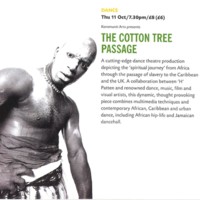
The Cotton Tree Passage
'The Cotton Tree Passage' was a dance theatre production by Koromanti Arts performed at The Drum in Birmingham as part of the Routes to Freedom season. The production depicted the spiritual passage of slavery from Africa to the Caribbean and the UK. A collaboration between 'H' Patten and dance, music, film and visual artists, this piece combined multimedia techniques and contemporary African, Caribbean and urban dance, including African hip-life and Jamaican dancehall.
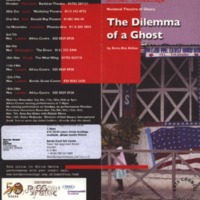
The Dilemma of a Ghost
Written by Ghanaian playwright Ama Ata Aidoo, The Dilemma of a Ghost deals with colliding cultures in 21st century Africa. An African-American woman accompanies her Ghanaian husband as he returns home, but the couple are haunted by ghosts of the inheritance of the slave trade. A collaboration between London theatre company Border Crossings and the National Theatre of Ghana, the production used music and dance to celebrate 50 years of Ghana’s independence and 200 years since the abolition of the transatlantic slave trade. The play was performed in Birmingham, Hull, Leeds, Leicester, London, Plymouth and Slough. The production was was accompanied by a new book from Border Crossings, working in collaboration with Anti-Slavery International. ‘Theatre and Slavery: Ghosts at the Crossroads’ explored the ways in which world theatre responds to key issues in modern society and politics, including the issue of contemporary slavery.